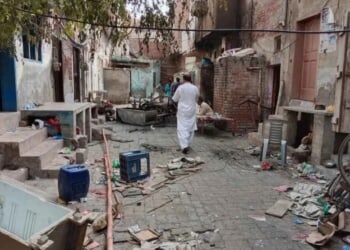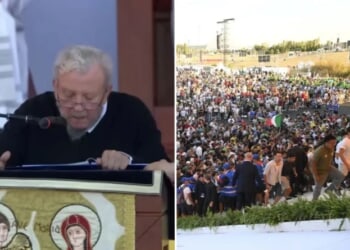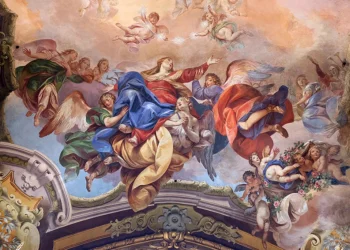Assumption Catholic Church in Minneapolis should have been ordinary and joyful: children in uniforms, parents greeting one another, the smell of hymnals and polished floors, the familiar cadence of morning Mass. Instead, horror struck. A young man, battling severe mental illness and the darkness within him, opened fire during the all-school Mass. Two children were killed, 14 more were wounded, and a community was left to grieve wounds that will never fully heal. What should have been a sanctuary—a place set apart, protected, holy—was shattered in an instant.
As a daily Mass-going Catholic and mother of 10 whose school-age children attend faith-based schools, I had just left morning Mass when the alerts began flooding my phone. My heart raced as I pictured my own children, their teachers guiding them through prayers, a school community settling into the familiar rhythm of worship. The thought that such a sacred moment could be pierced by gunfire made the world feel suddenly smaller, harsher, more fragile.
This attack is tragically not an anomaly. Americans remember the 2023 shooting at the Covenant School in Nashville, where three children and three adults were murdered in a Christian school. And after the leak of the Supreme Court’s draft opinion in Dobbs v. Jackson Women’s Health Organization, CatholicVote documented hundreds of acts of vandalism against Catholic churches: statues of the Blessed Mother defaced, tabernacles stolen, sanctuaries desecrated. In many cities, patrol cars sit outside synagogues, a sad but necessary reminder that people of faith cannot assume society will honor sacred space—they must rely on visible security just to worship safely.
Even government policy has sometimes treated sacred spaces as less important than the marketplace. During the pandemic, governors like Gavin Newsom in California and Andrew Cuomo in New York restricted religious gatherings while allowing big-box stores, liquor shops, and marijuana dispensaries to remain open.
More recently, the federal government permitted Immigration and Customs Enforcement to carry out raids near places of worship. Those who may be targeted include undocumented immigrants fleeing human traffickers or who have suffered sexual violence or exploitation by “coyotes” en route to the United States. Such permission pierces the ancient understanding that places of worship are places of refuge.
For believers, these realities are deeply painful. Christians understand that we are in this world but not of it, and that — as St. Augustine said — “our hearts are restless until they rest in You.” Yet throughout history, communities and governments recognized that houses of worship serve a unique social good: they cultivate mercy, build trust, and are essential to human flourishing. To treat sacred spaces as ordinary—or worse, as targets of violence or vandalism—is to sever one of the most crucial ties holding our social fabric together.
The young man who attacked Assumption Catholic Church was not merely ill; he was consumed by demons that thrive in isolation, despair, and anger. Those same demons seek to sever the bonds that faith communities create, to scatter communities, to frighten people of faith out of gathering. That is why this moment of mourning must also become a moment of resolve. Restoring respect for sacred spaces is not just about religious liberty—it is about hope, healing, and the witness of faith itself.
The shootings in Minnesota and Tennessee, the wave of church vandalism, the pandemic-era restrictions, and the constant threats facing Jewish communities all remind us that sacred space in America is under siege. But they also remind us that it is worth defending. For if we cannot honor what is holy, we will struggle to hold on to what makes us human. Yet people of faith cling to the promise: “the light shines in the darkness, and the darkness has not overcome it” (John 1:5). Every time people of faith gather to give glory to God, we witness His light breaking through. In defending sacred spaces, we not only protect our communities but also bear witness to the God who makes all things new.
Andrea Picciotti-Bayer is Director of the Conscience Project.
The views and opinions expressed in this commentary are those of the author and do not reflect the official position of the Daily Caller News Foundation.
All republished articles must include our logo, our reporter’s byline, and their DCNF affiliation. For any questions about our guidelines or partnering with us, please contact [email protected].
DONATE TO BIZPAC REVIEW
Please help us! If you are fed up with letting radical big tech execs, phony fact-checkers, tyrannical liberals and a lying mainstream media have unprecedented power over your news please consider making a donation to BPR to help us fight them. Now is the time. Truth has never been more critical!
Success! Thank you for donating. Please share BPR content to help combat the lies.
We have no tolerance for comments containing violence, racism, profanity, vulgarity, doxing, or discourteous behavior. Thank you for partnering with us to maintain fruitful conversation.






![Gavin Newsom Threatens to 'Punch These Sons of B*thces in the Mouth' [WATCH]](https://www.right2024.com/wp-content/uploads/2025/08/Gavin-Newsom-Threatens-to-Punch-These-Sons-of-Bthces-in-350x250.jpg)
![ICE Arrests Illegal Alien Influencer During Her Livestream in Los Angeles: ‘You Bet We Did’ [WATCH]](https://www.right2024.com/wp-content/uploads/2025/08/ICE-Arrests-Illegal-Alien-Influencer-During-Her-Livestream-in-Los-350x250.jpg)







